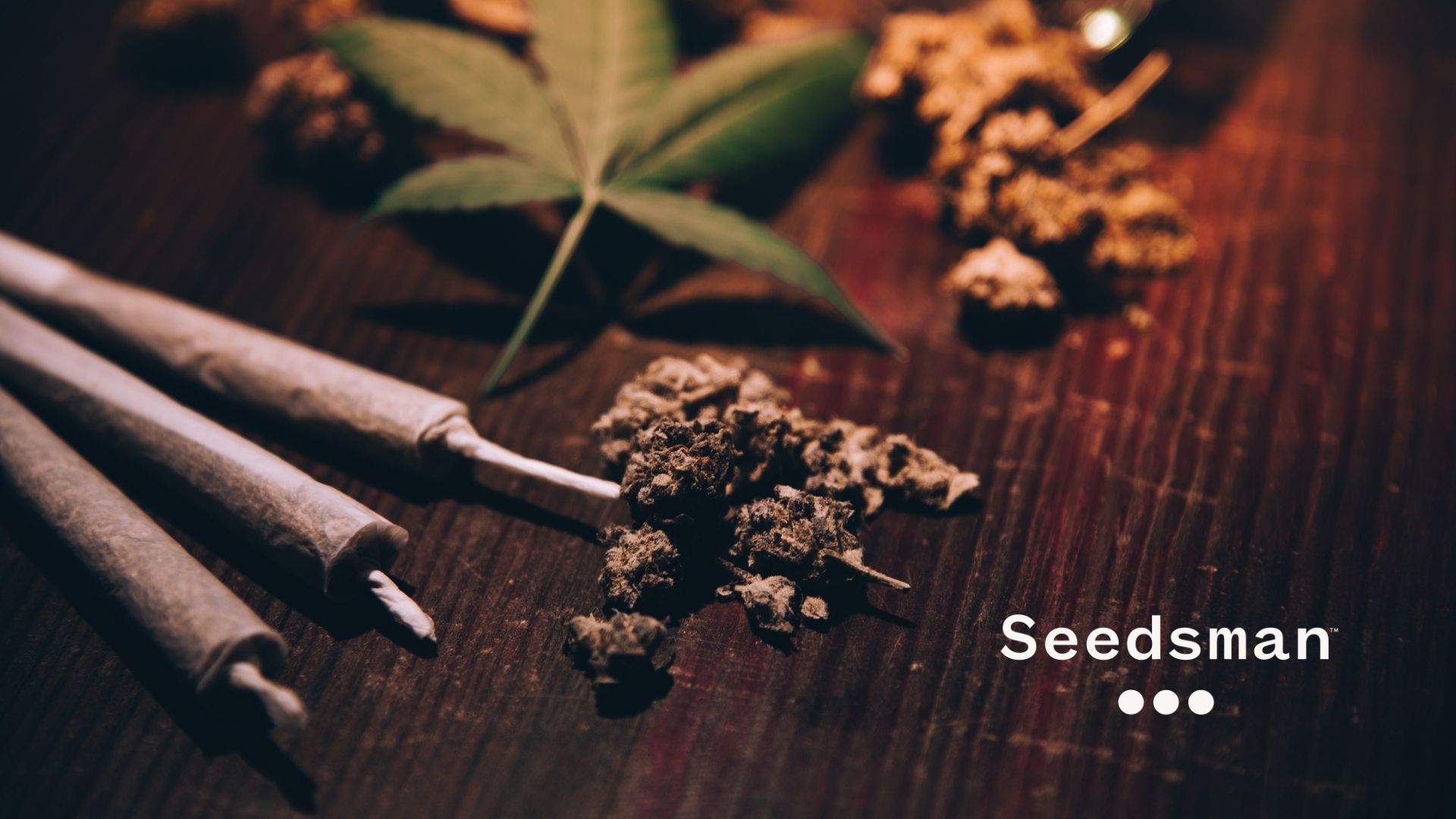
Where Cannabis Slang Comes From
The cannabis lexicon is as extensive as it is baffling, so with 4/20 just around the corner, it’s a good time to brush up on one’s stoner parlance. According to Time Magazine, there are at least 1,200 slang terms related to cannabis, and while many of these are of unknown origin, some of the more popular expressions can be traced back to their roots.
Without further ado, join us for a deep dive into the etymology of cannabis slang.
Marijuana
Now the most commonly used word for cannabis, ‘marijuana’ is an anglicised version of the original Spanish word ‘marihuana’ or ‘mariguana’. According to Martin Booth’s book Cannabis: A History, this term comes from Mexico and may even derive from the Aztec language. Other theories suggest that the expression comes from the phrase ‘Maria y Juana’, a slang term used by Mexican soldiers to mean ‘brothel’.
With the Mexican Revolution of 1910, vast numbers of displaced people migrated north to the United States, bringing their slang term for cannabis with them. When Harry Anslinger became the first director of the Federal Bureau of Narcotics in 1930, he began using the word marijuana to foster an association between pot and Mexican immigrants, thus racialising the plant and using it to stigmatise Latino communities in the US.
Mary Jane
Many believe Mary Jane comes from the word marijuana. Split into two words, marijuana becomes Mari + Juana which is similar to traditional Spanish names Maria and Juana.
Mary Jane is the English version of those names. That’s the theory that makes the most sense so it’s the one we’re sticking with!
420
At twenty past four, high school students in San Rafael California would meet at a statue of Louis Pasteur to smoke some marijuana. For them, 420 soon evolved from a time to a phrase, and then it passed through one high school generation to another, crossed cities,, States and continents and is now everywhere.
Like on Seedsman, where this 420 it’s buy 1 get 1 free on all Seedsman strains!
Pot
Another cannabis slang term with Mexican roots, the word pot became popular in the US in the 1930s and is a shortening of ‘potiguaya’. This, in turn, is a portmanteau of ‘potación de guaya’, a drink made by infusing wine or brandy with bud. The name means ‘the drink of grief’, which sounds a little melodramatic and ironic given how high you get when you smoke pot.
Joint
The first recorded use of the word ‘joint’ as a cannabis slang term comes from a 1938 article in the New Yorker. Written by leading newspaper journalist Meyer Berger, the piece describes a “marijuana party” in Harlem, where the smartly-dressed, bespectacled author must have stood out like a sore thumb.
That the other attendees used the word joint to refer to a… well, a joint, indicates that the term had already been in use for some time, though it’s difficult to pinpoint exactly when the word became a cannabis slang term. Tracing the term’s history, it is likely that people started calling opium dens’ joints’ in the late nineteenth century and that the word then evolved to refer to drug paraphernalia.
Jay
A Jay, or a J, is just an easier way of saying “joint”. Origins unknown, but pretty sure someone said “let’s smoke a j” in the 70s and it stuck.
Reefer
On sailing ships, reefing a sail means reducing the sail’s area by folding one edge of the canvas in on itself; a “reefer” is the sailor who rolls it. So, that’s one theory of origin. The Spanish slang grifo may of also had some influence on the rise of the word. Grifo has a few different meanings, but most notably “curly-haired”.
It’s a bit murky, but in the 1920s, somehow reefer gained popularity as a derogatory term for a cannabis user and became a common adjective to describe being high.
And then Cab Calloway sang “Reefer Man” in 1932 shortly before the film “Reefer Madness” came out in 1936.
Now it’s just something your dad says.
Spliff
In most countries, a spliff is a cannabis cigarette that contains a mixture of bud and tobacco, although the word probably originates in the West Indies, where it refers to a joint made solely of weed. Exactly how the term came into being is a mystery, but some sources claim it derives from Jamaican Creole and is a fusion of the words “split” – which may indicate a joint – and “whiff”, in reference to the smell of cannabis.
Roach
It’s amazing how many cannabis slang terms can be traced back to the Mexican revolution. The word ‘roach’, for instance, refers to the but of a joint and is likely to derive from the famous Mexican folk song ‘La Cucaracha’, which means ‘The Cockroach’.
Like most folk music, the song’s provenance is somewhat hazy, and while numerous variations of the original have arisen through the years, all feature the central motif of a maimed cockroach that has lost the ability to walk. One particular version is attributed to the soldiers who fought under the command of the famous revolutionary Pancho Villa and goes like this;
La cucaracha, la cucaracha / ya no puede caminar. / Porque le falta, porque no tiene / marihuana pa’ fumar.
This translates to: The cockroach, the cockroach / can’t walk anymore / because it lacks, because it doesn’t have / marijuana to smoke.
Exactly who or what the cockroach in this ballad symbolises is unknown, though some say the roach may be the Mexican dictator Victoriano Huerta. Others say the lyrics simply describe the experience of having smoked a joint right down to the roach, at which point one has run out of weed with which to get high.
Blunt
The term ‘blunt’ is most commonly used to denote a cigar that has been emptied of tobacco and filled with cannabis. The word can also describe a joint that has been rolled with a tobacco leaf wrap rather than rolling papers.
While it’s true that smoking a blunt can certainly take the edge off a person’s mood, the word doesn’t actually have anything to do with getting high. Instead, the term owes its existence to a cigar brand called Phillies Blunt, which was once the weapon of choice for blunt smokers in the US.
Ganja
Unlike most other slang terms for cannabis, the word ‘ganja’ can be easily traced to its origins and comes from a Hindi word for hemp. As long as 1800, the British raj listed ganja among the taxable items hailing from India, so we know the term has existed for several centuries.
When Indian labourers were brought to Jamaica to work on white-owned plantations following the abolition of slavery in 1834, ganja entered the vocabulary of local farmers. The word then became popular globally thanks to the spread of Rastafarianism in the twentieth century.
Chronic
According to Snoop Dogg, chronic was initially a misunderstanding of the word hydroponic.
As Snoop described it on his GGN internet show: “White boy came; he had some shit called hydroponic. But, we got so motherfcukkin’ high, n*ggas said, ‘hydrochronic.’ And that’s when we started calling it chronic.’”
Chronic then, as a slang term for strong marijuana does originate around this time. Green’s Dictionary of Slang first cites lyrics from Dr. Dre’s “Deeez Nuuuts” from The Chronic album: “It’s back on the track / With big money, big nuts, and a big fat chronic sack.”
Doobie
The word ‘doobie’ is of highly dubious origins. So much so that some people say the term actually comes from the word ‘dubious’, in reference to the questionable judgement of stoners when high. There’s no paper trail leading to the origin of this slang term for a cannabis cigarette, however, so it’s hard to say with any certainty how the expression came to exist.
Some people say it hails from Scooby-Doo (or Scooby Doobie Doo, to give him his full name) and is a homage to the character Shaggy. Rocking the classic stoner look, Shaggy is supposed to represent a typical 1950s Beatnik, and is based on a character called Maynard G. Krebs, who appeared on a sitcom called The Many Loves of Dobie Gillis.
Others believe the word doobie stems from another children’s TV show called Romper Room, which featured a giant bumblebee named Mr Do-Bee. It’s unclear where this hypothesis originates, though, as Mr Do-Bee has no apparent connection to weed.
Cultivation information, and media is given for those of our clients who live in countries where cannabis cultivation is decriminalised or legal, or to those that operate within a licensed model. We encourage all readers to be aware of their local laws and to ensure they do not break them.
Source link












